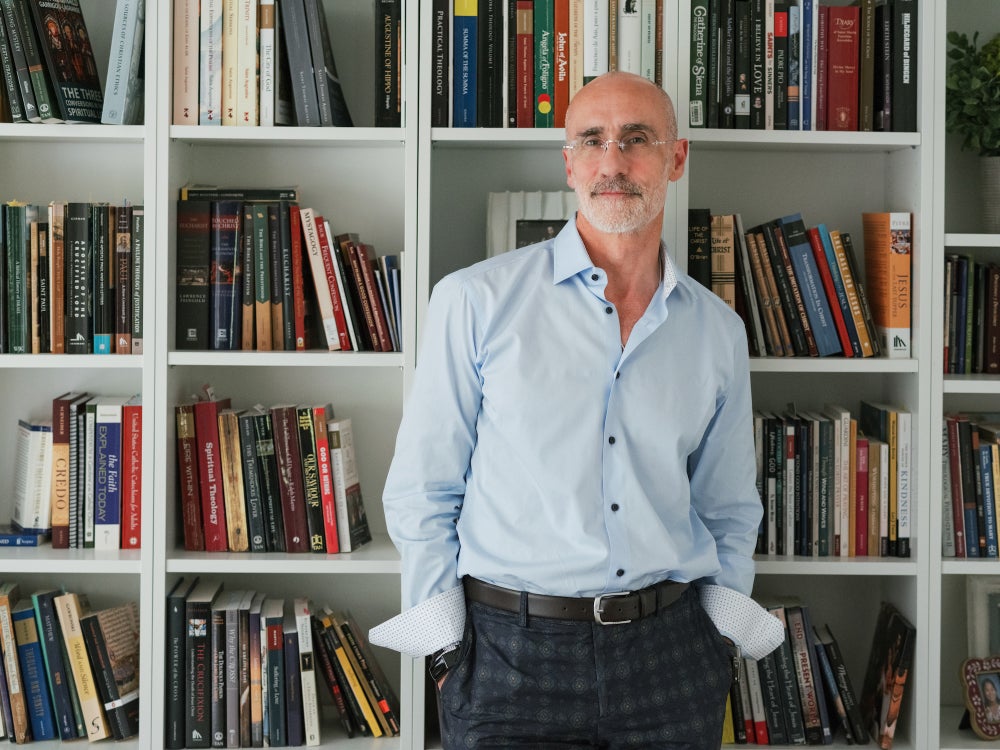“The first big mistake that people make is thinking that happiness is a feeling,” Arthur Brooks, professor at Harvard Business School and author of the forthcoming book The Happiness Files: Insights on Work and Life, says.
Image Credit: Jenny Sherman Photography. Arthur Brooks.
On the first day of class, Brooks asks his students to define “happiness.” Many of those students have a relatively sophisticated understanding of startups and business, but they tend to misunderstand “the startup of their life,” Brooks finds.
“If you want to become a billionaire in the business of life, it’s not about money or power,” Brooks says. “It’s about love and happiness, and they don’t even know what the currency is. They talk about their feelings, and I say, ‘That’s wrong. Feelings are relevant, but they’re nothing more than evidence of your happiness.'”
Related: ‘Finances Fuel Life Goals.’ These Top Money Secrets Can Make You Happier and More Successful, According to an Expert.
Brooks points to Thanksgiving dinner as an example: The smell of turkey is evidence of Thanksgiving dinner, but if you want to improve your nutritional profile and stay healthy, you need to be familiar with the ingredients and macronutrients on your plate.
“Chasing feelings [of happiness], which is like chasing the smell and trying to get healthy, is not going to work,” Brooks says. “You need to become good at understanding the science of enjoyment, satisfaction and meaning. Those are the macronutrients of happiness.”
Entrepreneur sat down with Brooks to learn more about how people can build happier careers and lives.
How do you find a satisfying job or career?
Ambitious twenty-somethings often ask Brooks what they should look for if they want to find satisfaction in their job or career.
The answer is a “very big, ethereal term,” according to Brooks: “Calling.”
“ Now, that doesn’t mean that you have to be Mother Teresa,” Brooks says. “It doesn’t mean that at all. Being a roofer can be your calling. Raising your children at home can be your calling. There are a lot of things that can be your calling, but you’re trying to find the thing that you were meant to do, which is to say that you’re trying to find something that will bring you a lot of meaning.”
Related: How to Find the Right Career Calling and Reduce Stress
Finding your calling doesn’t mean you’re going to have fun all the time or be satisfied every day of the week, but paying attention to two metrics can help you figure out if you’re doing what you’re meant to do, Brooks says.
“ If you’re earning your success, [meaning] your hard work and merit and personal responsibility are acknowledged and rewarded, and [you’re] serving other people, then you’ll feel like you’re meant to do what you’re doing, and that will be your calling,” Brooks explains.
Why don’t promotions and raises actually make you happy?
Think securing that title change or salary bump at work will make you happy? Think again.
Mother Nature doesn’t design people to be happy — Mother Nature designs people to be successful, Brooks says.
“Success 250,000 years ago didn’t mean getting to IPO with your startup, because there was no such thing,” Brooks says. “The equivalent was survival and mates. Sufficient calories, being safe for the night, getting through the winter and finding as many mates as you could. Propagating the species was the equivalent of ‘I made my first billion’ back in the day.”
Related: Why Aren’t You Happy, Even When You Get What You Want? This Founder Teamed Up With the Dalai Lama Himself to Cure Your ‘Insatiable’ Desire.
People who follow the impulse for professional success, thinking it will make them happy, often find themselves in an endless cycle that never brings the desired result, Brooks notes.
“If money, power and the admiration of other people are an intermediate goal to get to something more valuable — love and happiness — then great,” Brooks says. “But if it’s the end goal, it’s like drinking seawater. The more you drink, the thirstier you get.”
So, how much money do you really need to be happy?
In 2010, Princeton University professors Daniel Kahneman and Angus Deaton published a paper that showed that an increase in income improved people’s well-being — until they hit $75,000. After that, happiness plateaued.
Ten years later, research from a senior fellow at the University of Pennsylvania, Matthew Killingsworth, found that well-being does increase beyond the $75,000 threshold.
However, a collaborative project from Kahneman and Killingsworth, along with the University of Pennsylvania’s Barbara Mellers, in 2023 revealed that money can continue to buy happiness for people who are already happy, but it can only curb unhappiness to a point for those who are not.
“The suffering of the unhappy group diminishes as income increases up to [$100,000] but very little beyond that,” the report stated. “This income threshold may represent the point beyond which the miseries that remain are not alleviated by high income.”
Happiness and sadness activate overlapping and distinct areas of the brain.
“When you’re poor and become less poor, you have less of those negative emotions because you’re able to eliminate the things that are bothering you a lot, like making rent, paying your light bill, [raising your kid] in a safe neighborhood,” Brooks says. “But once you get past a very low threshold, you’re no longer eliminating those sources of unhappiness.”
Related: Science Says Money Does Buy Happiness If You Spend It the Right Way
Brooks suggests people try to reach an income level that eliminates their sources of unhappiness, then focus on the other areas of their life — like family, friendship, love and faith — that actually make them happy.
“Along the way, if you create a great business, and you love doing that, and it’s really fun and you bless a lot of people, [then go] to IPO and become a billionaire — more power to you,” Brooks says. “But it’s not the billion that’s going to do the heavy lifting for you.”
What should you spend money on for maximum happiness?
People can spend their money in five different ways, but one of them won’t contribute to their happiness, according to Brooks.
And that’s constantly buying more stuff just for the sake of it.
”Mother Nature tells you to [buy more stuff],” Brooks says. “That’s the evolutionary imperative, that peacocking: If I’ve got two Ferraris and nine watches and five houses, then I’m going to be showing all these excess resources and people are going to like me more. But you’re not going to be happier, and you’re going to be drawing the wrong kind of person.”
Related: This Financial Expert Reveals the Simple Spending Hack That Will Make You Happy, Even in a Recession
Brooks maintains that real happiness comes from spending money in the other four ways.
You can buy experiences to share with loved ones. You can outsource work so you have the time to read a book or do another activity you enjoy. You can donate money to support causes that matter to you or save and invest it for the future.
How can you cope with the anxiety of career uncertainty and potential layoffs?
Some people handle workplace uncertainty and layoff anxiety better than others.
As someone who isn’t “very risk-averse” and has changed jobs and rebuilt his career numerous times, Brooks isn’t intimidated by professional unknowns because he sees the value in embracing each new experience, he says.
“[Dealing with uncertainty] becomes easier when you recognize your own career as part of your entrepreneurial adventure,” Brooks explains. “You, as a person, are the enterprise. Your job or your career is one part of that. It’s naturally changing, and that means when it’s changing, you have to look at that not just with fear, anxiety and dread, but also with a sense of excitement.”
Related: 4 Tips To Overcome Career Transition Anxiety
Liminal periods of uncertainty have the potential to be some of the most fruitful times, according to Brooks.
“That’s when entrepreneurs in the business of life really thrive,” Brooks says. “It’s not going to be easy, but that’s okay. If you reframe it mentally as a time of fertility, a time of generativity, it’s a lot easier to deal with, and you’ll be more alert to opportunities.”
What should people do if happiness eludes them?
To anyone who feels dissatisfied, whether in their work, personal life or both, Brooks recommends asking one question: Am I behaving like a startup entrepreneur with my life or not?
“ If things aren’t going well in the business, you’d say, Okay, what am I missing about the market?” Brooks says. “What are the risks that I should be taking that I’m not taking, or risks that I am that I shouldn’t be? Am I paying attention to the currency that I’m trying to accumulate? Because that’s what entrepreneurs are always asking.”
Related: I Treated My Health Like a Business. It Changed My Life.
According to Brooks, it’s a mistake to approach your life like a “moribund legacy company” that doesn’t need to be profitable. Instead, he suggests operating like a startup that’s constantly evolving toward its vision.
“If I’m living on the edge of my seat, treating my life like an adventure, trying to accumulate fortune [in terms of the] billions of happiness — then life is great,” Brooks says.
Ready to break through your revenue ceiling? Join us at Level Up, a conference for ambitious business leaders to unlock new growth opportunities.








